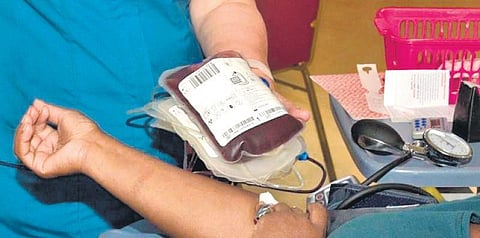

KOCHI: June 14 is celebrated as World Blood Donor Day. It also marks the birth anniversary of Austrian biologist and physician Karl Landsteiner, Nobel prize winner for the discovery of the ABO blood group system and known as the founder of modern blood transfusion.
The slogan for the 2023 World Blood Donor Day campaign is ‘Give blood, give plasma, share life, share often.’It focuses on patients requiring life-long transfusion support and underlines how everyone can play a role by giving the valuable gift of blood or plasma. The theme also highlights the importance of donating blood regularly to create a sustainable supply of blood and blood products.
Blood donation is considered the world’s most valuable donation as science hasn’t found an appropriate usable natural or synthetic substitute for human blood. So let’s dive into some facts about blood and plasma donations.
Who can donate blood?
Anyone who is mentally and physically fit and between 18 and 65 years of age with at least 45 or 55 kg weight can donate blood. If the requirement is specific components, the weight should be at least 55kg and the haemoglobin level should be above 12.5g per decilitre. Men can donate blood every three months and women every four months.
What is apheresis blood collection?
Here blood from the donor is collected into an equipment where it is centrifuged and separated into the required component and the remaining part is transfused back into the blood donor. This helps reduce the multiple donor exposure for a patient thereby reducing the chance of adverse reactions and developing alloantibodies. This also helps collect the desired component in higher quantity and better quality.
Why a blood bank
Maintaining an adequate supply of safe blood and ensuring their appropriate use have been a great challenge for developing countries such as India. To ensure universal access to safe blood products, the blood transfusion services (BTS) of a country need to know the requirements of their population.
According to WHO, blood donation by 1% of the population is generally taken as the minimum need to meet a nation’s basic requirement. However, for countries with more advanced healthcare systems, this requirement is higher.
As per the above norm, India’s demand for blood is around 14 million units — 1% of the 1.4 billion population. A study conducted by the National AIDS Control Organisation (NACO) found that India needs to collect 26.4 million units of blood to address the need for blood and components in the country. The supply was found to be 13.5 million, which brings us to the astonishing fact that there is a deficiency of 11 million units of blood.
What are myths about blood donation?
The main misconception is that ‘blood donation will make a person weak’. A few things to care about after blood donation are that one should restrain from doing heavy-weight exercises or jobs for at least two to three hours.
Also, a person who donated blood should consume iron-rich food to replenish haemoglobin faster. One should also drink a lot of water after blood donation to remain hydrated to reduce the chances of fainting.
Another myth is that ‘women cannot donate’. The fact is that except during the brief period of pregnancy, breastfeeding or miscarriages, all women above 18, who fulfill other criteria, can safely donate blood.
Another misunderstanding is that ‘a lot of blood will be taken’. The total blood volume of an average healthy adult is around 5 to 6 litres. Of which, only 450ml is taken which comes to less than 8% of the total volume. It is quite safe to bleed 450ml without any harmful effects in a healthy adult.
The writer is a consultant of transfusion medicine & transplant immunology at Medical Trust Hospital in Kochi